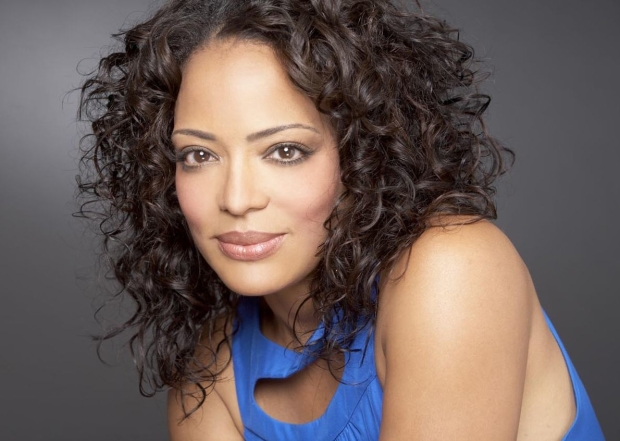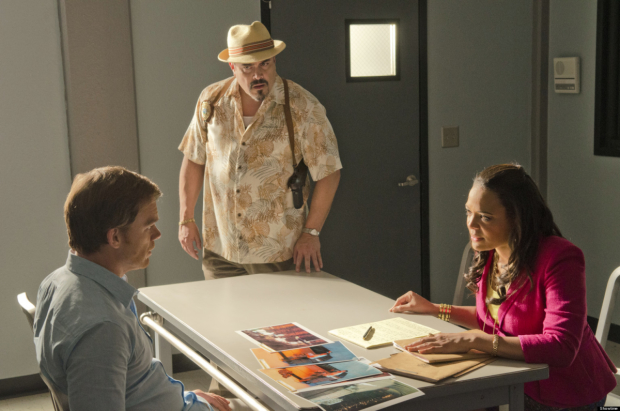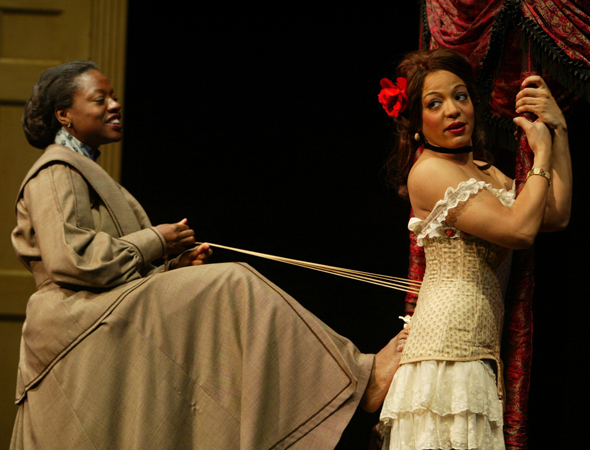Dexter Star Lauren Velez Catches Another Serial Killer
The actress breaks the fourth wall to ”Catch the Butcher” and chats about what makes her role in it a killer.
Lauren Luna Vélez certainly knows how to work with a serial killer, a trade she made intriguing as Capt. Maria LaGuerta opposite Michael C. Hall's murderous Dexter for seven seasons on Showtime. However, as LaGuerta she worked to put violent criminals behind bars; as Nancy in Adam Seidel's Catch the Butcher, she shares the stage with another dangerous denizen…though the reasons for her predicament are as mysterious as the killer himself.
In the dark comedy, directed by Valentina Fratti, Nancy is fascinated by the poems that a serial killer (Jonathan Walker) writes about his victims, so she sets out to find him. When she finds herself in his basement, the events are as unpredictable as they are deranged.
Vélez, who has been off-Broadway in The Happiest Song Plays Last and Intimate Apparel, is also well known for her work on Oz and New York Undercover. She recently spoke with TheaterMania about why she loves being in a "killer" show and how she would have liked to see Dexter end.

Catch the Butcher is difficult to describe to people because of the many themes and different psyches that it explores. How do you explain its complexities?
It's really complicated. Typically I say I'm doing a dark comedy about a woman who is searching for something and she's not sure what it is, so she puts herself in a position to be kidnapped by a serial killer to see what's on the other side of that. There's elements of it that are farcical, but there's so many things about it. It's touching in some places, and there is something about this search that in some ways is also spiritual. For me, it's chock-full of so many wonderful themes.
You're obviously drawn to stories that involve crime and murder. What drew you to Catch the Butcher?
I was fascinated by my character, Nancy. Typically I'm on the other side, looking for the butcher or helping somebody try to find the butcher. Nancy is sweet, childlike, damaged, quirky, funny — those aren't the type of things that normally come to me. The show is also really challenging. Playing this woman that wants to actually experience being kidnapped and killed is something that I've never done before. I've done a lot of research on women who fall in love with serial killers, or women who fall in love with the wrong kind of guy and what it is that drives that. I think it is the most fascinating part.

(© Showtime)
One could say there are some redeeming qualities about the serial killer in this play, similar to those in Dexter. What is it about the flawed antihero that is such a popular theme in entertainment?
Any time you can get some insight it's interesting. Nancy says to [the killer] Bill, "Everybody assumes these things about you, but I look at you and see something else." She's watching him and reading his words. She's moving beyond what she thinks are just actions, which of course are heinous. She thinks, I understand why you do this, which is the case with a lot of women who hire professionals and fall in love with men who are on death row or are serial killers. They conveniently put those actual crimes aside, or believe that they didn't actually commit them. They feel like, "No, I've keyed into this person, I understand them better than anyone," or, "There is something brilliant about this person, and by extension, somehow I'm special too." The fact that Charles Manson is getting married again? Crazy! It makes me think of Oz, where I played this prison doctor who falls in love with Ryan O'Reilly, who killed her husband. At the end of it she's like, "God help me. I'm in love with this murderer!"
You're shooting the film Adrift during the day, and performing at night. How does your role in the film differ from your other work?
It's about a family living on Long Island, a mother with three sons, and my character, the mother, is really struggling with her son who is a heroin addict. It's about how the family sort of crumbles because of this kid's drug problem. Ultimately, he dies. It's an important story and it's topical. It asks the question of how much of it was the mother's responsibility? When do you know that something is wrong, that something is happening with your child? I've never done anything like it before.
There was a lot of upset about the way Dexter ended. If you could change any one thing about the finale, what would it be?
I think it should have been Dexter who died, not his sister, because they killed all the women on the show. Even though Dexter was killing to take out the trash and for all the right reasons, I still feel like Dexter needed to die. Maybe it is this idea that it would have made things seem like there was more order, but for sure, I wish Debra [Jennifer Carpenter] hadn't died. But thankfully she's OK and working on Limitless now!

(© Joan Marcus)








